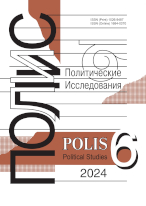Religion as an adaptation factor for immigrants:
peculiarities of the U.S. case
Kargina I.G.,
Cand. Sci. (Soc.), Assoc. Prof., Moscow State Institute of International Relations (University), MFA Russia, irenkargina@mail.ru
DOI: 10.17976/jpps/2014.02.12
Kargina I.G. Religion as an adaptation factor for immigrants: peculiarities of the U.S. case. – Polis. Political Studies. 2014. No. 2. https://doi.org/10.17976/jpps/2014.02.12
The article points out that immigration into developed countries has reached a global scale which generates new risks for the economic and social well-being of the recipient-countries, as conditions conducive to various sorts of conflict are cultivated. One of these conflict-catalyzing factors is the religious identity of immigrants, which is inexorably linked with their ethnic and cultural identities. This identity often contrasts with the dominant cultural and religious traditions of their “new” home. The article reviews ways in which religion in the USA and the religiosity of immigrants influence the processes of integration and adaptation. The author proves that the USA constitutes an example of a country where religion is at the forefront of social and everyday life, the level of religiosity amongst citizens is quite high, and the religious market is relatively diverse. The constitutionality, reinforced by concept of separation of church and state, plays an important role, as throughout history it facilitated the gradual development of a multi-religious environment on the U.S. territory, the nurturing of a tolerant attitude towards other religions and a general sense of respect for religion. In this context religious organizations in the USA play an essential role in the process of integration of immigrants and the native population – provide a safe heaven as well as various services and resources necessary for successful adaptation to a new society. It is also revealed, that most immigrants are Christians who practice religions which have taken roots in the United States. Believers of other religions either “melt in the pot” of the Christian environment, or fall under the care of other religious groups which have taken their firm roots in the American culture over the past decade. Henceforth, the conclusion is drawn that in the U.S. is a factor which eases the adaptation and assimilation processes, and religiosity serves as a “bridge” which helps immigrants in this process.
See also:
Kargina I.G.,
Christianity’s metamorphoses in post-modern landscape. – Polis. Political Studies. 2012. No5
Round Table of the «Polis» Journal, Kara-Murza A.A., Chugrov S.V., Zubov A.B., Rashkovsky Ye.B., , Zhukova O.A.,
Russian liberalism and christian values. – Polis. Political Studies. 2011. No3
De Vreede E.,
Culture, civilization and identity. – Polis. Political Studies. 2012. No5
Bardin A.L.,
Integration of Immigrants with Different Cultural Background: the German Experience. – Polis. Political Studies. 2017. No6
Vainshtein G.I.,
European Identity: the Desired and the Real. – Polis. Political Studies. 2009. No4





.jpg)






 print
print
.jpg)
.jpg)